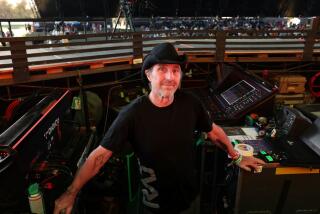Berlin’s Paul Kalkbrenner makes serious, populist techno
At Coachella this year, the dance tents had a new and welcome committment to the underground. Sure, the visuals were ravishing and the headliners people-pleasing, but it was clear that something new and stranger was in the sweaty Sahara air.
Maybe no artist embodied that transition better than Paul Kalkbrenner. A longtime underground hero in his native Berlin, he’s released six albums (including his latest, “Guten Tag”) showcasing his soulful, unfussy and long-simmering techno. His profile got a major boost when, as a first-time actor, he starred in the cult-rave flick “Berlin Calling,” whose soundtrack featured his monster single “Sky and Sand,” which became a club and pop staple for over two years on the German charts.
He headlines the Fonda Theatre on his first-ever solo headlining tour Friday night. Don’t mistake it for a “DJ set” - he only plays original material generated live on his own custom hardware. We talked to him over email, and Friday’s show signals another cohering move between the weirdo underground and big-tent U.S. festival culture.
PHOTOS: Unexpected musical collaborations
“Sky and Sand” spent two years in the German top 100. That’s an amazing run for any song. Why do you think fans not only embraced it, but kept discovering and coming back to it for so long?
Since it’s out, it’s been 140 weeks in the German Top 100, which is amazing. The music, the lyrics, they are quite timeless, it doesn’t sound dated, even when you listen to it now. It’s something I am very proud of.
That song was tied to your acting debut, “Berlin Calling,” which you starred in as a novice actor. So much serious electronic music, especially that in Berlin, is about staying out of the spotlight and keeping the focus on sounds and productions. Growing up as an underground artist, was it strange for you to adjust to being the center of attention in a film?
“Berlin Calling” was a chance to do something unique, once in a lifetime. The role came about very organically; it wasn’t planned. Initially the director, my friend Hannes Stohr, brought me in to consult, but after working together on the movie for a while, he told me I had to play Ickarus. We had no idea what would happen, nor was there any plan, the movie was an X Factor. It certainly helped me to reach more people with my music, and that was a very happy accident.
I caught your Coachella set and really enjoyed it, and unlike many of the artists there, you were not afraid to take your time with long breakdowns and to really let tracks breathe and build. I know you focus solely on your own material and your own live hardware when you play – is it important to you to show fans the difference between being a “DJ” and an electronic artist performing original, organic material live?
PHOTOS: Iconic rock guitars and their owners
I have never been a DJ, nor could I ever, as selfishly I just want to play my own music to people. I am not trying to ‘show’ people that I am playing live, because I simply am playing live. Every show is different, the music is arranged on stage differently every time I am performing. I play only my own music, and my music isn’t simply bang-bang dance, that’s not the music I want to make, or play to people. I have played many large shows to tens of thousands and I found that you can take your time and the crowd will go with you; not everything has to be bang-bang the whole time.
Over your career, you’ve stayed pretty true to a thoughtful techno sound, while so many electronic music peers have gone more “pop.” Is it more interesting to you to find new ways to to elaborate on this relatively more difficult sound? How do you feel like you’re still honing your craft and finding new, interesting ways of writing?
For a long time, I wasn’t able to make the music I wanted to. I simply didn’t know how. So my music hasn’t evolved really; it’s been the same all along, it’s just now I am able to make the music sound like I want it to. My music comes from inside of me; it’s very personal, and I try to spend as much time free from outside influences so to allow that music to come out. It’s been 18 years and six albums now. Every album is different, but it’s still Paul Kalkbrenner. I want to keep that, as that is the music that I want people to hear.
Berlin has become such an international center for “techno tourism,” with people flying in from around the world to go to Berghain and Tresor and Weekend. What do you make of that? Is it good for Berlin venues and artists to have so much attention, or does it draw bad crowds that don’t respect the city and music? Or a mix of both?
PHOTOS: Rolling Stones through the decades
Honestly I never go out really, so it’s hard to say. I had many amazing experiences listening to techno in Berlin after the wall came down at the club E-Work, but now I don’t go out too much.
You’re many albums into your career, yet amazingly this is your first North American solo headlining tour. You play to tens of thousands in Europe, but with all the attention on the growth of electronic music in the U.S. in the last few years, where do you feel like you fit in over here? Do you have aspirations to play the big American EDM festivals, or is your allegiance more purely with the underground?
I don’t have any allegiance to any scene or another. I simply make the music I want to make; if people like it, that’s wonderful. I am not in the U.S. so I can play one festival or another, I am here so people have the chance to see me play, if they would like. In America people don’t really know me, so it’s interesting to come at this time, when electronic music is more popular, and see if people are more receptive to techno and my music. Of course I could stay in Europe, it would be easy, but it’s important to keep pushing; coming to America is a challenge.
ALSO:
Beatles U.S. albums box set due Jan. 21
Why isn’t Britney Spears’ latest album a hit?
Beyonce’s game change: a surprise album release
More to Read
The biggest entertainment stories
Get our big stories about Hollywood, film, television, music, arts, culture and more right in your inbox as soon as they publish.
You may occasionally receive promotional content from the Los Angeles Times.

















